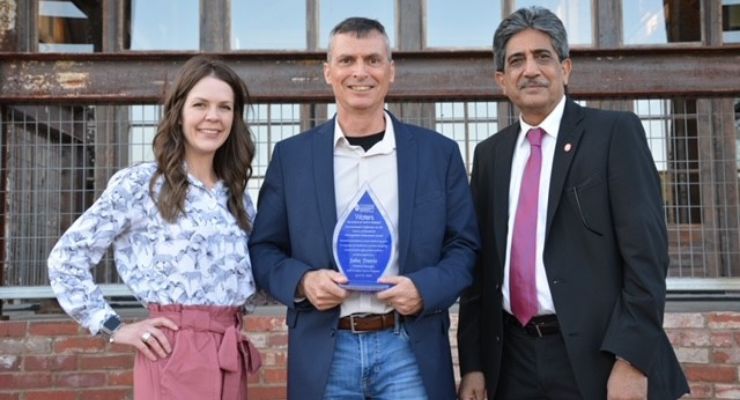07.10.23
Photo caption: (L-R) Emily Britton, principal market development manager, Waters Corporation; John Travis, principal technical manager, health science certification, NSF; Ikhlas A. Khan, PhD, DLitt, director of the National Center for Natural Products Research and Director at the University of Mississippi.
John Travis, principal technical manager of health sciences certification at NSF, a nonprofit dedicated to setting public health standards, received the International Conference on the Science of Botanicals’ (ICSB) Distinguished Achievement Award sponsored by Waters Corporation at the 21st annual Oxford ICSB event in April.
“I am honored to be recognized alongside other research dignitaries in the dietary supplements and herbal medicines fields,” Travis said. “I’m pleased that my colleagues find my contributions worthy of recognition.”
“NSF is full of world class talent that makes a difference in public health every day,” said David Lonza, vice president of global health sciences at NSF. “However, it’s something else when the industry recognizes it, too. We’re proud of John for his incredible career, dozens of achievements, and this distinguished award.”
“John Travis’ collaborative, kind, and passionate attitude about science was a key factor in this decision,” said Ikhlas A. Khan, PhD, DLitt, director of the National Center for Natural Products Research at the University of Mississippi and director of the Food and Drug Administration Center of Excellence.
Some highlights over Travis’ 28-year tenure at NSF include his development and leadership of the NSF Certified for Sport program, as well as analytical methods used to test products. Sports and anti-doping organizations that use the standard include MLB, NHL, NFL, NBA, and USADA.
Travis was also involved in developing NSF/ANSI 173, the only accredited American National Standard for dietary supplements, which was first devised in 1999. This was vital to NSF’s Contents Tested certification program. Both certifications fill a need for independent assessments of quality for dietary supplements.
“NSF was approached by members of the supplement industry who had worked with us in other industries, notably the drinking water filtration industry,” Travis said. “They felt the dietary supplement industry had an image concern and wanted to pre-empt more government regulatory action by self-regulating. So, NSF embarked on developing the standard, which was finalized and adopted in 2003. In 2004, NSF was approached by the NFL to develop a sports certification program, which eventually evolved into Certified for Sport.
“Effort and diligence are two words which effectively describe driving the adoption of both,” he added. “NSF had to educate the stakeholders in both programs on our credentials in developing standards and executing certification programs in an impartial manner. This was no small feat. Trust is not always an easy belief to build.”
Travis said the reason NSF pursued American National Standard accreditation was further credibility and consensus among all parties.
“The standards creation process is a transparent activity with balanced representation of industry, regulatory, and certification bodies. All have equal input. In this way, all stakeholders must resolve issues to reach consensus on the requirements of the standard. I suppose that is the biggest challenge, reaching consensus on contentious issues for which the stakeholders do not agree.”
John Travis, principal technical manager of health sciences certification at NSF, a nonprofit dedicated to setting public health standards, received the International Conference on the Science of Botanicals’ (ICSB) Distinguished Achievement Award sponsored by Waters Corporation at the 21st annual Oxford ICSB event in April.
“I am honored to be recognized alongside other research dignitaries in the dietary supplements and herbal medicines fields,” Travis said. “I’m pleased that my colleagues find my contributions worthy of recognition.”
“NSF is full of world class talent that makes a difference in public health every day,” said David Lonza, vice president of global health sciences at NSF. “However, it’s something else when the industry recognizes it, too. We’re proud of John for his incredible career, dozens of achievements, and this distinguished award.”
“John Travis’ collaborative, kind, and passionate attitude about science was a key factor in this decision,” said Ikhlas A. Khan, PhD, DLitt, director of the National Center for Natural Products Research at the University of Mississippi and director of the Food and Drug Administration Center of Excellence.
Some highlights over Travis’ 28-year tenure at NSF include his development and leadership of the NSF Certified for Sport program, as well as analytical methods used to test products. Sports and anti-doping organizations that use the standard include MLB, NHL, NFL, NBA, and USADA.
Travis was also involved in developing NSF/ANSI 173, the only accredited American National Standard for dietary supplements, which was first devised in 1999. This was vital to NSF’s Contents Tested certification program. Both certifications fill a need for independent assessments of quality for dietary supplements.
“NSF was approached by members of the supplement industry who had worked with us in other industries, notably the drinking water filtration industry,” Travis said. “They felt the dietary supplement industry had an image concern and wanted to pre-empt more government regulatory action by self-regulating. So, NSF embarked on developing the standard, which was finalized and adopted in 2003. In 2004, NSF was approached by the NFL to develop a sports certification program, which eventually evolved into Certified for Sport.
“Effort and diligence are two words which effectively describe driving the adoption of both,” he added. “NSF had to educate the stakeholders in both programs on our credentials in developing standards and executing certification programs in an impartial manner. This was no small feat. Trust is not always an easy belief to build.”
Travis said the reason NSF pursued American National Standard accreditation was further credibility and consensus among all parties.
“The standards creation process is a transparent activity with balanced representation of industry, regulatory, and certification bodies. All have equal input. In this way, all stakeholders must resolve issues to reach consensus on the requirements of the standard. I suppose that is the biggest challenge, reaching consensus on contentious issues for which the stakeholders do not agree.”




























